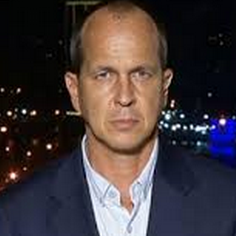People
Peter Greste 'uncomfortable' with celebrity status
Friday 23 October 2015
 Peter Greste (photo) has lost count of the interviews he’s given since being deported from Egypt in February after spending 400 days in jail on charges of spreading false news and inciting terrorism. He does it because he is determined to spread a different message - about freedom of speech and freedom of the media.
Peter Greste (photo) has lost count of the interviews he’s given since being deported from Egypt in February after spending 400 days in jail on charges of spreading false news and inciting terrorism. He does it because he is determined to spread a different message - about freedom of speech and freedom of the media.
The former Reuters correspondent is guest of honour at the 2015 Kurt Schork Memorial Fund Awards in International Journalism to be held in London on 29 October. He feels a responsibility to speak out.
Greste, who is Al Jazeera’s East Africa correspondent based in Nairobi, remains uncomfortable with his new-found celebrity status but is committed to the task. He no longer keeps track of the number of interviews, saying: “it must be in the hundreds!”
“I much prefer being on the other side (of the camera),” he added in an interview from Sydney before the 14th annual awards ceremony. “The attention is nice but it gets to the point where I wonder why it’s happened the way that it has. The whole thing about celebrity has always been uncomfortable and it’s still uncomfortable.”
The annual awards, unique to text journalists, were established in memory of Kurt Schork, an American freelancer who was killed in Sierra Leone in 2000 while on assignment for Reuters.
Greste, who worked with Schork as a young freelancer in Sarajevo, accepts that the media spotlight on him is a vital part of spreading his message about freedom of speech: “I feel it’s justified. There’s an audience out there. People know enough about the story and enough about me for it to carry some weight, some credibility and so if people are listening then it’s worthwhile using that opportunity.”
“I feel I have a responsibility to use the platforms that I’ve got,” he added.
His quest is not just on his own behalf. Nine Al Jazeera staff were sentenced to between seven and 10 years jail each in June last year.
Greste, Al Jazeera International bureau chief Mohamed Fahmy and producer Baher Mohamed were tried and sentenced in Cairo. The other six, including Alaa Bayoumi and British journalists Dominic Kane and Sue Turton, were sentenced in absentia and like Greste, they remain in legal limbo.
Except for Fahmy and Baher who were pardoned by presidential decree last month, “We’ve all got the same convictions and the same charges against us, without a pardon and with a criminal conviction as a terrorist and vulnerable to arrest at any point,” Greste said.
International travel is problematic. It may be politically unlikely that the Egyptians would arrest any of them but he said: “It’s a ‘Sword of Damocles’ that hangs over our heads. I’m not sure that they ever will do it but it adds a degree of uncertainty,” he said.
“I don’t think the presidency and the judiciary are joined up. I was described at the trial as ‘absent without reason’, a refusal to recognise the president’s decree that got me out of the country in the first place. It suggests the court for whatever reason chose not to recognise the president’s authority. I suspect some kind of internal division between the president and the judiciary. If the judiciary or someone in it wanted to embarrass the president or they want to send a message or want to undermine the president’s authority, then it could quite easily sign a warrant.”
Greste’s ability to work internationally is inhibited. “I can’t go to Saudi Arabia, I wouldn’t visit the Emirates (beyond transit), I’m not going pretty much anywhere in North Africa or the Middle East. I’ve got to be very careful about what I do in places like the African Union (AU) because every country in it has an extradition treaty with Egypt and in those situations I’m vulnerable.”
Greste said that after the awards ceremony he would go back to Kenya “where my plan is not to file, not to go back to my old job as East Africa Correspondent.”
“Unofficially, I’ll have some sort of special reporter role with a global brief looking at big issues like the refugee crisis and other big stories of the day, signature stories. I’m not going to chase fire engines anymore,” he said.
Greste first met Schork in Sarajevo when he was a young freelancer “doing what so many young freelancers did, just showing up with a couple of strings and no clue.
“Kurt helped keep me alive and gave me some of the very first and most basic lessons in getting through and surviving in a place like Bosnia… and then three or four years later I was back, working for Reuters out of Belgrade, and I worked alongside Kurt who was based in Sarajevo at the time so we had a lot to do with each other through that period as well.
“‘Keep your head down and figure out where the bullets are coming from’ was his most succinct advice. It was a formative period for me - now some 25 years ago - that I was attending UN briefings with Kurt and following him and others trying to learn,” he said. ■
- « Previous
- Next »
- 302 of 575